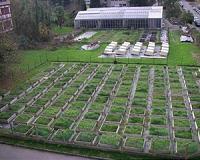| . |  |
. |
Beijing (UPI) Mar 10, 2011 China's southern industrial town Xintang, known as the "jeans capital of the world," is making progress in tackling pollution, state-run news agency Xinhua reports. Xintang produces 260 million jeans each year, accounting for about 40 percent of all the jeans sold in the United States. Dyeing, washing and bleaching Xintang's jeans involve "some of the dirtiest processes in the textile industry," Greenpeace has said. The process requires high volumes of water as well as heavy metals and other chemicals, with dye and wastewater typically ending up in rivers surrounding the factories, turning waterways into dark, oozing smelly masses. Xintang has spent $119 million to treat the Shuinan Zhichong, Fenghuang, Xipi, and Niushizhen rivers, says Huang Jianping, head of the city's environmental protection bureau. But Huang admits that a large portion of those funds was used to compensate people forced to relocate from river banks. While Huang has succeeded in shutting down a number of dyeing plants that failed to meet environmental standards, it isn't a sustainable response, she said, because it hurts the economy. "The best solution is to move the plants into industrial parks," Huang told Xinhua. There, polluted water can be collectively treated in water treatment plants approved and monitored by the local government. Of Xintang's remaining 76 dyeing plants, 68 have been relocated to industrial parks. Huang said there are also several water treatment plants with a daily capacity totaling 400,000 tons to treat and monitor all factory water discharge and 80 percent of household water discharge. A Greenpeace report released in December, however, concluded that testing by an independent laboratory revealed heavy metals such as copper, cadmium and lead in 17 out of 21 samples of water and sediment from Xintang as well as Gurao, also a major textile town in southern China specializing in underwear. One of the sediment samples from Xintang showed cadmium levels 128 times above national environmental standards, Greenpeace said. "The responsibility of wastewater regulation and phasing out hazardous chemicals in textile manufacturing must be faced by not only Xintang and Gurao's industries and government, but also throughout China," said Greenpeace in a statement. "It is imperative that the textile industry implements clean production methods, starting by phasing out the use and release of hazardous chemicals." The draft of China's latest five-year plan, which includes further environmental protection measures to tackle water, air and soil pollution, is being voted on this week in Parliament.
Share This Article With Planet Earth
Related Links Our Polluted World and Cleaning It Up
 Protecting Ecosystems, Pollution Remediation Goals Of Research
Protecting Ecosystems, Pollution Remediation Goals Of ResearchHouston TX (SPX) Mar 09, 2011 Cleaning up pollution, protecting soil from erosion and maintaining species-rich ecosystems are some of the goals of a computational ecology project by a University of Houston (UH) scientist and his team. Published recently in a top journal, the work sheds light on a new method to speed up research in the ecology of plants. Marc Garbey, a professor of computer science and mathematics at UH ... read more |
|
| The content herein, unless otherwise known to be public domain, are Copyright 1995-2010 - SpaceDaily. AFP and UPI Wire Stories are copyright Agence France-Presse and United Press International. ESA Portal Reports are copyright European Space Agency. All NASA sourced material is public domain. Additional copyrights may apply in whole or part to other bona fide parties. Advertising does not imply endorsement,agreement or approval of any opinions, statements or information provided by SpaceDaily on any Web page published or hosted by SpaceDaily. Privacy Statement |